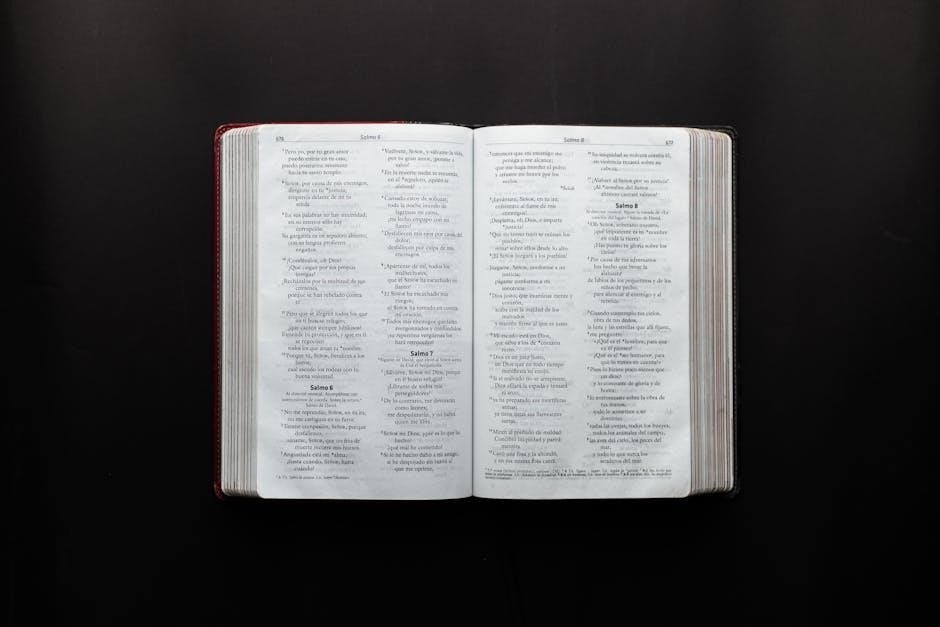The Vulgate Bible, translated by Jerome in the 4th century, is the Latin version of the Holy Scriptures. It became the foundation of Christian tradition in the Western Church, influencing liturgy, theology, and education for centuries. As a standard text, it remains significant for scholars and clergy today.
1.1 Historical Background of the Vulgate Bible
The Vulgate Bible emerged in the 4th century as Jerome translated Hebrew and Greek texts into Latin. Commissioned by Pope Damasus, it replaced earlier disjointed Latin versions. Jerome’s meticulous work ensured linguistic accuracy, blending Jewish and Christian traditions. Despite initial resistance, the Vulgate became the authoritative Latin text, shaping Western Christianity. Its historical significance lies in unifying biblical texts and influencing liturgy, theology, and education for centuries, remaining a cornerstone of Christian scholarship.
1.2 Significance of the Vulgate Bible in Christian Tradition
The Vulgate Bible holds immense significance in Christian tradition as the authoritative Latin text for centuries. It unified scripture, providing a common source for liturgy, theology, and education. Its influence shaped Western Christianity, impacting art, literature, and theology. As the official text, it guided Church doctrine and practices, ensuring consistency across diverse regions. The Vulgate remains vital for scholars and clergy, offering deep insights into biblical interpretation and historical contexts, solidifying its role as a foundational religious and academic resource.

The Latin Vulgate Translation Process
The Vulgate Bible was translated by Jerome, commissioned by Pope Damasus, to standardize Latin scriptures. He revised existing texts and consulted original Hebrew and Greek sources, ensuring accuracy and clarity. This process laid the foundation for a unified biblical text in Latin, crucial for scholarly study and liturgical use.
2.1 Jerome’s Role in Translating the Bible into Latin
Jerome, a renowned scholar, was commissioned by Pope Damasus to translate the Bible into Latin, aiming to correct inconsistencies in existing texts. Using original Hebrew and Greek sources, Jerome meticulously revised the Old and New Testaments. His work, completed in the 4th century, resulted in the Vulgate, which became the authoritative Latin Bible; Jerome’s translation not only standardized biblical texts but also ensured their accessibility, making it a cornerstone of Western Christian tradition and scholarship.
2.2 Challenges in Translating Biblical Texts into Latin
Jerome faced significant challenges while translating the Bible into Latin. He had to reconcile divergent Greek and Hebrew manuscripts, ensure theological accuracy, and adapt complex religious concepts into Latin. The lack of established Latin terminology for biblical ideas required creative solutions. Additionally, Jerome’s commitment to literal translation sometimes clashed with the need for readable Latin. These challenges underscored the complexity of producing a text that was both faithful to the original and accessible to Latin-speaking communities.

The Council of Trent and the Vulgate Bible
The Council of Trent in 1546 affirmed the Vulgate as the official Latin text of the Scriptures, emphasizing its authority and use in the Catholic Church.
3.1 The Council of Trent’s Declaration on the Vulgate
The Council of Trent, convened in 1546, officially declared the Vulgate as the authentic Latin text of the Scriptures. This decree established the Vulgate’s authority within the Catholic Church for liturgical and doctrinal purposes. The council emphasized its role in preserving the integrity of biblical teachings, ensuring it remained the standard reference for theological discussions and official church use. This declaration solidified the Vulgate’s position as a foundational text in Western Christianity for centuries to come.
3.2 The Vulgate as the Official Latin Text of the Scriptures
The Vulgate’s status as the official Latin text of the Scriptures was reinforced by the Council of Trent, making it the authoritative version for the Catholic Church. Its widespread use in liturgy, theology, and education cemented its importance. The Vulgate became the standard reference for biblical studies in the Western Church, influencing countless scholars and theologians. Its official recognition ensured its enduring relevance and accessibility, particularly through the availability of PDF versions for modern study and research.

The Evolution of the Vulgate Bible Over the Centuries
The Vulgate evolved from manuscript copies to printed editions, ensuring its preservation and accessibility. Digital versions, like PDFs, further enhance its study and relevance today.
4.1 Manuscript Tradition and Variations
The Vulgate Bible’s manuscript tradition spans centuries, with variations emerging due to manual copying errors and regional interpretations. Jerome’s translation from Hebrew and Aramaic sources influenced its textual accuracy. Over time, scholars have analyzed these variations to reconstruct the most reliable text, ensuring the Vulgate’s integrity for future generations.
4.2 Printed Editions of the Vulgate Bible
The Vulgate Bible transitioned from manuscripts to printed editions during the Renaissance, with Gutenberg’s press facilitating widespread distribution. Early printers like Aldus Manutius and Robert Estienne produced notable editions, standardizing the text. The printed Vulgate became a cornerstone of Catholic liturgy and scholarship. Digital versions, such as PDFs, now offer convenient access to these historical editions, preserving their textual integrity for modern study and research.
The Theological and Scholarly Significance of the Vulgate
The Vulgate Bible holds profound theological significance as the authoritative Latin text shaping Western Christian doctrine. Its scholarly importance lies in its precision and influence on biblical exegesis, making it a vital resource for theological studies and historical research, with PDF versions ensuring its accessibility for modern scholars.
5.1 Influence on Western Christian Theology
The Vulgate Bible profoundly shaped Western Christian theology, serving as the primary text for doctrinal development and liturgical practices. Its authoritative status, affirmed by the Council of Trent, solidified its role in shaping Catholic tradition and influencing Church Fathers and medieval theologians.
Jerome’s translation provided a unified Latin text, ensuring theological consistency across the Western Church. It remains a cornerstone of Christian scholarship, with its PDF versions preserving its legacy for modern theological study and reflection.
5.2 The Vulgate as a Scholarly Resource
The Vulgate Bible is a foundational scholarly resource, offering a Latin version of the Scriptures that has shaped theological and historical research for centuries. Its precise translation and textual consistency make it invaluable for scholars studying early Christian doctrine and liturgical practices.
PDF versions of the Vulgate provide easy access for modern researchers, enabling comparative studies with other biblical texts. Its influence on education and theological discourse remains unparalleled, cementing its role as a critical tool for academic and religious scholarship.

Accessing the Vulgate Bible in PDF Format
The Vulgate Bible is widely available in PDF format, with free downloads from reputable sources like Vulgate.org and AGES Software, offering high-quality versions for study and reference.
6.1 Sources for Downloading the Vulgate Bible PDF
The Vulgate Bible PDF is readily available from various online sources. Vulgate.org offers a comprehensive and free download option, while AGES Software provides high-quality versions ideal for scholarly use. Additionally, digital libraries and repositories like archive.org ensure accessibility for researchers and enthusiasts alike. These sources are reliable and offer accurate renditions of the text, making them invaluable for both study and reference purposes.
6.2 Benefits of Digital Versions for Study and Research
Digital versions of the Vulgate Bible offer enhanced accessibility and convenience for scholars and enthusiasts. PDF formats enable easy searching, annotation, and cross-referencing, while eliminating the need for physical storage. Digital editions also facilitate comparison with other translations and critical commentaries. Additionally, they provide cost-effective and space-saving solutions, making them ideal for academic and religious research. These tools empower deeper engagement with the text, fostering efficient and insightful study experiences.

Tools and Resources for Studying the Vulgate Bible
The Vulgate Bible is supported by various digital tools, including PDF editions, online archives, and specialized software for in-depth analysis and comparative studies, enhancing scholarly engagement.
7.1 Latin Vulgate Bible Commentaries and Annotations
Scholars and theologians have produced extensive commentaries and annotations on the Vulgate Bible, offering insights into its translation and theological significance. These resources, often available in PDF format, provide detailed explanations of Jerome’s translation choices and the historical context of the text. Annotations also highlight linguistic nuances and doctrinal implications, making them invaluable for both academic and religious study. Digital editions further enhance accessibility, allowing for deeper engagement with the Vulgate’s rich tradition and scholarly contributions.
7.2 Software and Apps for Vulgate Bible Study
Various software and apps are available to facilitate in-depth study of the Vulgate Bible. These tools offer features like text search, cross-references, and linguistic analysis. Apps such as Bible study platforms provide access to the Vulgate alongside modern translations, enabling comparative analysis. Additionally, some software includes dictionaries, grammatical aids, and historical commentaries to enhance understanding. These digital resources are particularly useful for scholars and students, making the Vulgate more accessible and easier to study in the digital age.

Comparative Analysis of the Vulgate with Other Translations
The Vulgate Bible is often compared to the Septuagint and modern translations, offering insights into textual differences and linguistic nuances in biblical scholarship.
8.1 Differences Between the Vulgate and the Septuagint
The Vulgate, translated by Jerome, differs from the Septuagint, a Greek Old Testament, in language, scope, and textual variations. Jerome used Hebrew sources, while the Septuagint was translated from Hebrew into Greek. This results in differences in Old Testament content and interpretations. Textual discrepancies, such as the order of books and specific passages, highlight distinct theological emphases. These variations are crucial for scholars analyzing biblical accuracy and historical context, offering deeper insights into the evolution of scriptural texts.
8.2 The Vulgate Compared to Modern Bible Translations
The Vulgate, in Latin, contrasts with modern translations like the King James Version or NIV, which use contemporary languages. While the Vulgate retains archaic Latin, modern translations prioritize readability. Differences in translation philosophy, such as literal vs. dynamic equivalence, affect the interpretation of key passages. Despite these differences, the Vulgate remains a foundational text, influencing many modern translations and providing valuable insights for scholars. Its historical significance ensures its relevance alongside newer versions.
The Linguistic Impact of the Vulgate Bible
The Vulgate standardized Latin for biblical texts, shaping liturgical and scholarly language. Its precise terminology influenced religious discourse, ensuring Latin’s enduring role in theology and education.
9.1 Latin as a Liturgical and Scholarly Language
The Vulgate Bible solidified Latin as the liturgical and scholarly language of the Western Church. Its precise translations and consistent terminology provided a common tongue for theological discourse and education. Latin became the standard for religious texts and academic discussions, ensuring its enduring influence in both liturgy and scholarship. This linguistic foundation remains vital for studying Christian theology and understanding the historical development of religious texts.
9.2 The Vulgate’s Influence on Latin Vocabulary and Grammar
The Vulgate Bible profoundly shaped Latin vocabulary and grammar, standardizing liturgical and scholarly language. Jerome’s precise translations introduced new terms and refined existing ones, creating a linguistic foundation for theological discourse. Its influence extended beyond religion, shaping Latin’s evolution and academic writing. The Vulgate’s impact on Western Civilization’s linguistic heritage remains unparalleled, ensuring its legacy as a cornerstone of Latin textual tradition and scholarly communication.

The Vulgate Bible in the Digital Age
The Vulgate Bible is now accessible in digital formats, including PDFs, through online archives and libraries, ensuring its preservation and facilitating study and research globally.
10.1 Online Archives and Digital Libraries
The Vulgate Bible is widely available in PDF format through various online archives and digital libraries, such as Vulgate.org and academic repositories. These platforms provide free access to the complete text, enabling scholars and enthusiasts to study the Latin Scriptures effortlessly. Digital libraries often include searchable and downloadable versions, enhancing research capabilities. This accessibility ensures the Vulgate’s continued relevance in theological and historical studies, bridging the gap between ancient texts and modern scholarship.
10.2 Open-Source Projects and Collaborative Scholarship
Open-source projects, such as GitHub repositories like lechton/LS-Vulgate-Latin, provide collaborative platforms for scholars and enthusiasts to study and enhance the Vulgate Bible. These initiatives enable community-driven contributions, fostering accuracy, accessibility, and innovation. They promote shared knowledge, innovation, and the preservation of the Vulgate for future generations, making it a vital resource in the digital age.

The Vulgate Bible and Its Cultural Impact
The Vulgate Bible profoundly shaped art, literature, and Western civilization, becoming a foundation of religious and cultural identity. Its influence extends to education and liturgical practices.
11.1 Art, Literature, and the Vulgate Bible
The Vulgate Bible has deeply influenced art and literature, inspiring masterpieces from medieval illuminated manuscripts to Renaissance paintings. Its Latin text has shaped liturgical music and theological writings, making it a cornerstone of Western cultural heritage. The Vulgate’s language and themes are reflected in works by Dante, Milton, and others, cementing its role as a foundational text in art and literature throughout history.
11.2 The Vulgate’s Role in Western Civilization
The Vulgate Bible played a pivotal role in shaping Western civilization, serving as a unifying religious and educational text. It standardized Latin, fostering a common language across Europe, and influenced liturgy, theology, and cultural identity. The Vulgate preserved classical knowledge and shaped medieval education, making it indispensable in universities. Its impact extends to law, art, and literature, embedding biblical themes in Western heritage. As a foundational text, it remains central to understanding the intellectual and religious history of the West.

Modern Relevance of the Vulgate Bible
The Vulgate Bible remains relevant today as a foundational text for religious study and academic research. Its digital availability in PDF format enhances accessibility, making it a valuable resource for scholars and theologians examining Latin biblical traditions and their enduring influence on Christian thought and liturgical practices.
12.1 Use in Academic and Religious Settings
The Vulgate Bible is widely utilized in academic institutions for studying Latin and biblical history. In religious settings, it serves as a liturgical resource, enriching theological discussions. Its availability in PDF format facilitates easy access for scholars and clergy, ensuring its continued relevance in both educational and spiritual contexts, bridging ancient traditions with modern accessibility.
12.2 The Vulgate Bible in Contemporary Scholarship
The Vulgate Bible remains a vital resource in contemporary scholarship, offering insights into biblical translation and historical theology. Its PDF versions provide researchers with accessible tools for comparative studies. Scholars often analyze its linguistic and textual nuances, while theologians appreciate its influence on Western Christian thought. Digital formats enhance its utility, making it easier for modern academics to engage with this foundational text in their studies and research.



